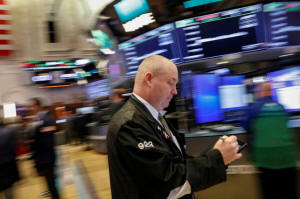Trade tensions set for brighter U.S. corporate spotlight
 Send a link to a friend
Send a link to a friend
 [April 21, 2018]
By Lewis Krauskopf [April 21, 2018]
By Lewis Krauskopf
NEW YORK (Reuters) - The potential for an
intensifying trade dispute to undercut the U.S. stock market could
become clearer next week when a host of multinational companies reports
quarterly results that may provide a glimpse into the impact of those
global tensions.
A broad trade war scaled up a list of worries for Corporate America and
equity investors after U.S. President Donald Trump imposed tariffs last
month on imports of steel and aluminum. His comments and posts on
Twitter about unfair behavior by U.S. trade partners have rattled the
market, which has pulled back from record highs early this year.
China has responded with tariffs of its own, leading to fears about a
full-blown trade war and injecting fresh volatility into a stock market
that has been more jittery over the past two months.

Of 25 U.S. companies seen by Credit Suisse as most exposed to a trade
war, more than half will report their results in the coming week. They
include Halliburton Co on Monday, 3M Co and Texas Instruments Inc on
Tuesday, Boeing Co on Wednesday, Intel Corp on Thursday and Chevron Corp
on Friday.
Overall, more than 180 companies in the benchmark S&P 500 index are due
to report results next week. Some companies have already weighed in on
trade tensions in the early stages of earnings season.
"Management has to walk a fine line between flapping their arms and
lobbying against tariffs, and presenting themselves as vulnerable to
tariffs," said Jack Ablin, chief investment officer at Cresset Wealth
Advisors in Chicago.
Of particular concern will be executives' views about their exposure to
China, the world's No. 2 economy and an important market for many U.S.
companies.
“I’d like to know if things do deteriorate with China, how much it would
affect them,” said David Joy, chief market strategist at Ameriprise in
Boston.
Omar Aguilar, chief investment officer of equities at Charles Schwab
Investment Management in San Francisco, said he expects companies to
start discussing how they may alter their budget for capital expenditure
"depending on the outlook of policies related to trade."
Company comments about tariffs and trade could blemish what is expected
otherwise to be a stellar earnings season, which includes the first full
quarter with the recently passed U.S. corporate tax cuts. With 87
companies having reported so far, S&P 500 profits in the first quarter
are expected to have increased a whopping 20 percent, according to
Thomson Reuters data.
[to top of second column] |

Traders work on the floor of the New York Stock Exchange (NYSE) in
New York, U.S., April 18, 2018. REUTERS/Brendan McDermid

With investors focused on earnings, the S&P 500 was set to rise by almost 1
percent for the week, but the benchmark index is little changed from where it
ended 2017.
Trade tensions cast a shadow on an otherwise rosy report about U.S. economic
growth from the U.S. Federal Reserve this week.
In the latest "Beige Book," the Fed's periodic summary of contacts with
businesses, the words "tariff" or "tariffs" were mentioned 36 times, compared to
zero mentions in the March 7 Beige Book.
"Contacts in various sectors including manufacturing, agriculture, and
transportation expressed concern about the newly imposed and/or proposed
tariffs," according to the report, which covered the period from March to early
April.
Martin Anstice, the chief executive of Lam Research, said this week that the
chip equipment maker had yet to see an impact on its business from tariffs, but
was watching for any dampening of consumer confidence or changes to domestic
equipment company agendas.
"If things got a little bit tit-for-tat, then there are obviously risks at a
minimum that we need to be attentive to," Anstice told analysts on a conference
call.

Honeywell Chief Financial Officer Tom Szlosek called the China tariffs "a fluid
situation", and that the diversified industrial manufacturer was assessing its
exposure "while also actively developing mitigation plans."
Any trade war would erode economic growth and affect its business, said Hamid
Moghadam, CEO of Prologis Inc, a real estate company specializing in warehouses,
but he added that "I don't think we're quite there yet."
"All of our customers that I'm aware of have basically had their head down doing
their business and not paying too much attention to what comes out in the tweets
in the morning until there's something specific they can react to," Moghadam
said on his company's call.
(Additional reporting by Sinead Carew in New York and Noel Randewich in San
Francisco; Editing by Bernadette Baum)
[© 2018 Thomson Reuters. All rights
reserved.] Copyright 2018 Reuters. All rights reserved. This material may not be published,
broadcast, rewritten or redistributed.
Thompson Reuters is solely responsible for this content. |